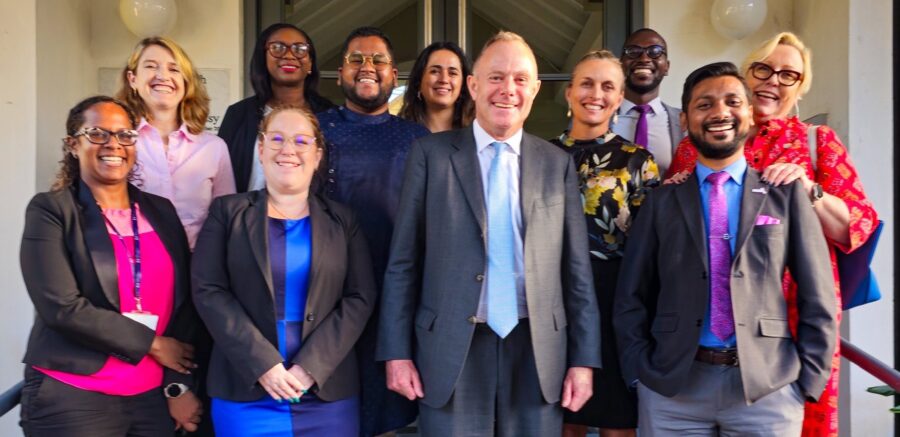The world is increasingly polarised on LGBT rights. There is progress to celebrate, but concern is also growing over a rollback of rights which is accelerating, not just in Africa and the global south, but also in parts of the global north.
In the past year, we have seen increased attempts to introduce anti-LGBT legislation on every continent. The appalling Anti-Homosexuality Act in Uganda – backed by religious campaigns financed from within the United States – has expanded the criminalisation of LGBT people, introducing the death penalty for ‘aggravated homosexuality’ which includes repeat offences. Similar legislation is being promoted across Africa, most recently in Ghana with provisions to criminalise even identifying as LGBT. Russia has designated the ‘international LGBT movement’ as ‘extremist’, so that anyone even displaying LGBT symbols is now at risk of 10 years in prison. In Iraq, homosexuality has been formally criminalised for the first time, with penalties of 10-15 years’ imprisonment introduced as the punishment for homosexuality or the promotion of sexual orientation or gender.
This is the tip of the iceberg (PDF, 6.5MB). The FCDO is currently tracking attempts to introduce regressive laws and policies in over 20 countries. And it’s not just LGBT people who are threatened: the rights of women and girls are increasingly being rolled back, too.
The negative effects of discriminatory laws can be profound. I’ve heard at first hand from brave Ugandan citizens the devastating impact on vital sexual health services as well as their personal safety. My recent conversations with activists in Iraq and Lebanon were similarly disturbing. Not only are people living in fear, but advocacy is becoming ever more dangerous.
With 4.2 billion people going to the polls in 2024, divisive issues relating to LGBT people, women and girls and sexual and reproductive health rights will continue to be used for political advantage. Anti-rights actors capitalise on political instability, existing discriminatory laws and policies, and entrenched social stigma to advance their objectives. Misinformation campaigns portray LGBT rights falsely as part of a neo-colonial agenda that undermine traditional family and cultural values and impose ‘Western liberal ideas’ on the rest of the world.
Repressive new laws pose fundamental threats to democracy and freedom around the world, and they also represent a challenge to us over how we respond.
We need to be smart, but we must not be reticent about our concerns, or fall into the trap of being silenced. Greater collective effort, more effective measures and robust challenge — including sometimes public censure — will be needed to counter the rollback and ensure that we are true to our values.
The litany of anti-gay laws can be depressing. But as I travel around the world, I see progress, too, often with the steadfast support of the UK’s diplomatic and development network. Many countries have implemented laws and policies that protect LGBT people from violence and discrimination. Since IDAHOBIT last year, Cook Islands, Mauritius, and Dominica have decriminalised consensual same-sex relationships, Latvia has legalised same-sex partnerships, and Estonia and Greece have introduced same-sex marriage. Thailand, which I visited recently, is in the process of passing equal marriage legislation, and there is potential for similar advance in Japan, which I will visit shortly.
In my third year as the Prime Minister’s Special Envoy on LGBT+ Rights, my pride in the UK’s international work on this issue only grows. Our diplomatic missions around the world continue to work, mostly behind the scenes but sometimes in the spotlight, to support the advance of human rights for LGBT people. The UK’s £40 million, 5-year international LGBT+ Rights Programme will help to transform lives as we support civil society organisations who are working to reduce violence and discrimination, improve access to services, and advance legislative reform.
I am optimistic that there will continue to be positive developments on LGBT rights across the globe, not least as a new generation sees social issues differently, just as we witnessed a remarkable change of attitudes in our own country. Change will not come evenly, and we must remember that our reforms have been relatively recent: when I was born it was a crime to engage in homosexual conduct. Nor did we experience an overnight transformation, but rather a series of steps which steadily moved the dial forward.
But equally we must wake up to the reality of the global rollback of rights in other parts of the world, understand the threat and mobilise with our allies to counter it. We need to build broader coalitions — for instance, ‘propaganda’ laws undermine democratic freedoms of expression in a way which should marshal wider opposition. We need to focus more on the drivers of discrimination — religious fundamentalism as well as toxic populism — and develop effective strategies to counter these.
No-one should live in fear of violence or discrimination simply because of who they are, but millions do, and that is the truth which IDAHOBIT reminds us of today.

